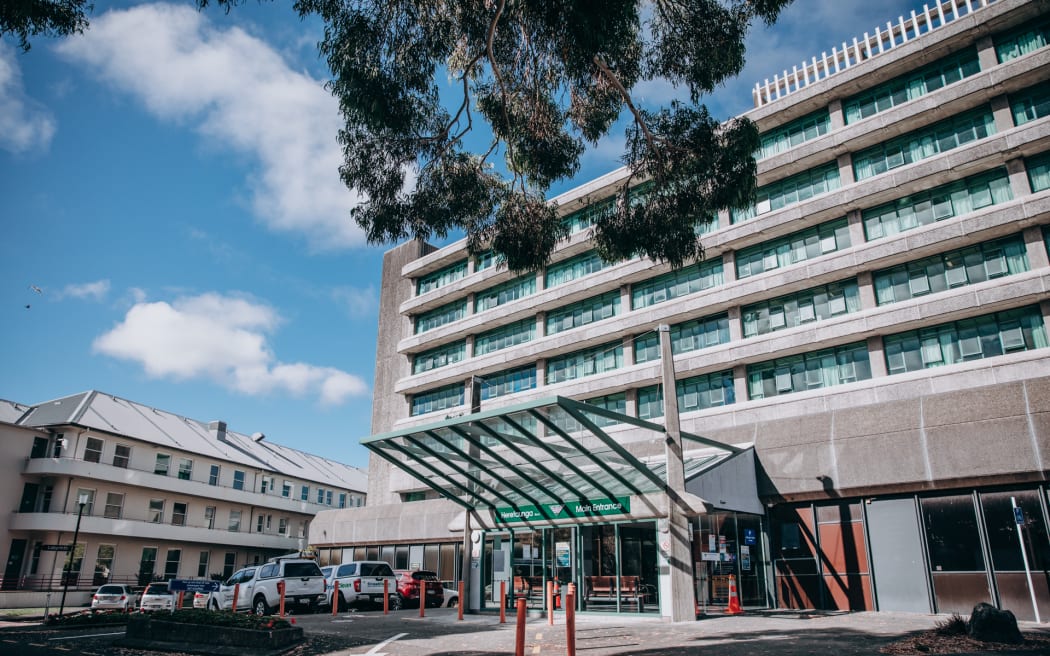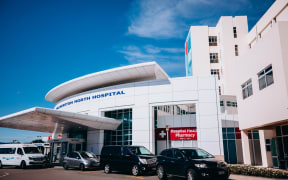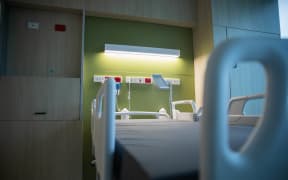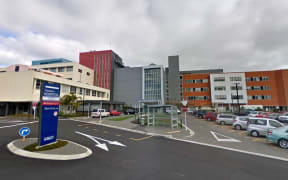
Maya miscarried in Hutt Hospital's emergency department. Photo: RNZ / Dom Thomas
Warning: This story discusses miscarriage
A traumatised woman who miscarried in Hutt Hospital's emergency department says no one prepared her for the fact her extremely premature baby would be born alive - nor did anyone from the maternity ward answer ED's calls for help.
The hospital says the miscarriage was "not predictable or preventable", but has admitted the case had highlighted a number of areas for improvement.
Maya* said losing her baby at 15-and-a-half weeks was made more traumatic by the indifferent care she received, after arriving at hospital late at night, bleeding and in huge amounts of pain.
Her midwife had phoned ahead to tell ED and obstetrics to expect her, but she said she was initially told to take a seat in the waiting room for 15 or 20 minutes.
"I was basically in active labour in a room full of people. The triage nurse kept telling me, 'You're having some cramping'. But when she took my vitals for the second time, my heart rate was really high, she said 'Oh, you do seem to be in quite a lot of pain'."
Maya was initially put into a cubicle with a curtain before being shifted to a resuscitation room.
Staff taped an incontinence pad over the window to give her some privacy.
"The ED doctors were great but they didn't know what they were doing. They did an ultrasound and showed us she was still alive.
"My partner texted my mum saying, 'She's all good', not realising what was going to happen."
Maya said she was clinging to hope that something could be done - or that the contractions would stop, as they had two days before.
On that occasion, she had spent more than eight hours in ED before she was given the all-clear by an obstetrician and sent home.
This time, however - despite several calls to obstetrics for assistance - no one came.
"The ED doctor said 'I'm going to have to examine you because no one is coming'. She did, and she said 'I think I'm looking at the membranes but I'm not 100 percent certain'."
A short time later, the ED doctor and a nurse helped Maya deliver her baby.
"She was born alive but we didn't know she would be. No one came to tell us, and it would have been brief but still they took that," Maya said.
"I knew she would be like a little person but I wasn't 100 percent sure I would be in so much pain and I was l like 'Will she look all right? Do I want to look?' So I didn't look, my partner didn't look, we didn't realise - and the notes just read they put her to the side."
About half an hour later, the duty doctor from obstetrics arrived.
"She said she was sorry, but there was nothing she could have done anyway."
Maya disagreed. It would have made all the difference if she had been told earlier that she was going to miscarry and that the baby would be born alive, she said.
"They could have said, 'You will have to stay in ED but we will look after you'."
She said the doctor then ran through a checklist of questions - which included asking whether her partner was the father of both her children - and inspected the placenta, remarking aloud that it appeared to be complete.
It turned out that was not the case.
After seven weeks of pain and bleeding, Maya paid $320 for a scan, which showed part of the placenta had not come away.
She had to return to Hutt Hospital to have it removed.
"They treated me like I wasn't worth their time because my baby was going to die. And again, because she is dead - who cares?"
'Number of areas for improvement'
In a written statement, the director of hospital and specialist services at Capital Coast and Hutt, Jamie Duncan, said the doctor on duty in obstetrics had been managing an emergency but attended Maya in ED "well within the ED target of patients being seen by a specialty within two hours if they are clinically stable".
Women who went into labour before 20 weeks during business hours were usually referred to the hospital's Early Pregnancy Clinic.
After hours, ED provided care until the patient could be seen by a specialist.
"While we recognise that [Maya] may have been better prepared for the outcome had the obstetric and gynaecology clinician been able to attend and explain sooner, it was not able to be predicted that the miscarriage would occur when it did," he said.
"Our formal comprehensive review has not found anything that could have been done differently to alter the tragic outcome of this case, however it did highlight a number of areas for improvement.
"Work is now underway to incorporate education about foetal loss into the orientation package for new ED staff ."
The hospital also told Maya that discharge summaries for pregnant people in their second trimester who presented to ED with contractions would now include information about possible miscarriage risk.
"But as my discharge summary from my first visit to ED arrived after I had already miscarried, that would not have been particularly useful," she said.
"The only good thing about miscarrying in ED was that [the] doctor and nurse were incredibly lovely and empathetic."
Community advocate Vicki Culling - who supports affected families - said the health system's response to miscarriage was still hit-and-miss.
"So many parents I've spoken to over the years have talked about fronting up to any number of entryways into our health system like ED or through their GP, and feeling like they're the first people ever to have experienced this, the loss of a baby," she said.
"Sometimes they talk about it being treated really casually."
A national approach for people who suffered baby loss was desperately needed, she said.
"That's something that could probably help staff who are doing the best they can for these families."
Health New Zealand Te Whatu Ora has said work on designing a national plan - which was first recommended in 2019 and given the go-ahead in 2021 - was due to begin early this year.
*name changed for privacy
Where to get help:
Healthline 0800 611 116
Grief Centre 0800 331 333






